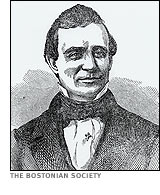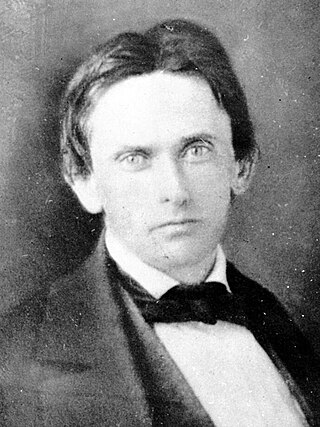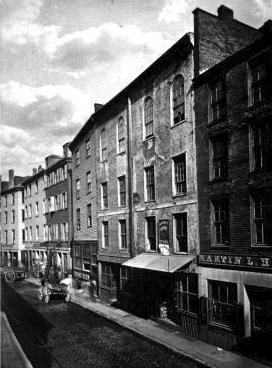
Francis Tukey (1814 - November 27, 1867) was the City Marshal of Boston, Massachusetts, from 1846 to 1852 and a member of the California State Assembly.

Francis Tukey (1814 - November 27, 1867) was the City Marshal of Boston, Massachusetts, from 1846 to 1852 and a member of the California State Assembly.
Francis Tukey was born in Falmouth, Maine in 1814. His family was well established in the area of Falmouth. His father was Benjamin Tukey, as was also the name of his grandfather. His grandfather fought in the Battle of Saratoga during the American Revolution. Upon the town's celebration of the surrender of General Burgoyne, the elder Benjamin Tukey was killed accidentally. As the celebration had commenced around Alice Greele's Tavern, Benjamin was mortally wounded by the premature discharge of a cannon. Benjamin Tukey left behind two children: Benjamin, Francis's father, and William. Francis Tukey is described as "5 feet, 9 inches tall, hair black as a raven, eyes large, dark and piercing with a pale face and an infectious smile." [1] Francis Tukey was a mechanic by trade and left Falmouth for Boston, Massachusetts to practice his trade further. After moving to Boston, he decided that he would pursue a career in law instead. Tukey entered the Harvard Law School and graduated after two years in 1843. Francis Tukey was admitted to the Suffolk bar on March 6, 1844.
Entering the law enforcement profession would be Tukey's calling and he would become appointed as the City Marshal of Boston by Mayor Josiah Quincy Jr. The position had been more of a revolving political door at the time. During the eight years between 1838 and 1846, there were six men appointed to the seat of city marshal. Francis Tukey was the successor to an office held by Benjamin Pollard, Daniel Parkman, Erza Weston, James Blake and Ira Gibbs. Tukey was appointed to the high-profile position at age 32.
The early years of Tukey's era as marshal was relatively quiet compared to what he would encounter close to the end of the decade. He began with the reorganization of the Boston Police Department. Under Tukey, the force increased to 22 officers during the day and 8 at night. They were dispatched throughout the city at $2.00 per day and $1.25 per night. The city was divided into sections and the order was set to clean up the streets of Boston. The increased visibility of officers gave rise to local notoriety to certain constables, such as Derastus Clapp and Samuel Fuller. [2]
During the 1848 public excavation on Boston Common, Tukey and his people discovered stolen money in front of an eager crowd. The January 7 excavation found $1100.00. This was the beginning of his public image in Boston and he welcomed the publicity.
He was in charge of the investigation of the Parkman–Webster murder in 1849–50. In 1851, he returned runaway slave Thomas Sims to Georgia after a court ordered compliance with the Fugitive Slave Law.
Shortly thereafter, Tukey began using raids to clean up the city. Tukey had an eye on vice establishments in the city. The early results of the first raid concluded that nine men and sixty women were arrested for prostitution. The following week's raid is known as the "Celebrated Ann Street" raid. There were over 150 arrests made in the red-light district of Boston on 23 April 1851. The targets were gamblers and prostitutes, with Tukey finding great success.
Again in 1851, Francis Tukey instituted a weekly "show-up of rogues. [3] " The policy he established was to have known criminals show up and be identified in public as criminals. This was to make sure that the public knew their faces and could identify the criminals if they had to. The first collection brought 76 pickpockets, burglars, thieves and more that were forced to "run a gauntlet of crowing citizens who tore their clothing and marked their backs with chalk."
The results of Francis Tukey's time as city marshal are varied. During Tukey's reign, it is believed that he neglected the growing number of wandering children in the Boston streets. The children, if taken in, would become apprentices or domestics until they reached adulthood. This was a rather "unenlightened attitude toward juvenile delinquency [4] " in Boston at the time.
Francis Tukey would be the city marshal until 1852, a tenure lasting six years. Benjamin Seaver, the mayor, removed Francis Tukey and most of the Boston Police force and replaced him with Gilbert Nourse Esq (1852–1854). The resignation was forced. Upon his removal, Tukey decided to relocate to Sacramento, California.
Francis Tukey's decision to leave Boston for Sacramento was not an attempt to leave the public realm behind. Here he became a member of the California State Assembly, with a seat in the 16th District legislature beginning in 1863 and also a member of the Board of Levee. During his time on the Board of Levee, he helped decide the length of term and the process for the election of Levee officials. His time in California did encounter other notoriety as he came in front of the Supreme Court of California as an appeal was filed from a verdict rendered against him by the Sixth Judicial District of California. In this appeal, investment in property bought by another man, D. O. Mills, where Tukey was also an investor came before the court. The issue at hand was that Tukey was an investor on real estate property of lot 4 between J and K streets and Fourth and Fifth streets in Sacramento. The third that was in the possession of Judson and George B. Haycock was sold to Mills. During which time, the taxes had not been paid on the property. The sheriff in Sacramento was deeded to sell the property to recoup the money owed. Tukey, in having failed to pay the taxes, forced the property to be sold and left a loan of $4000.00 to Mill's debt. The selling of the property was eventually allowed, having the courts agreed to the original decision that the sheriff did have the right to sell the property to reclaim debts and the owner was now, in fact, D. O. Mills.
Francis Tukey "demonstrated the police as a constant, serious, full-time presence into the social spaces of (Boston). [3] " He patrolled the streets of Boston with the great efficiency. According to Tukey, "there were 227 houses of prostitution known in Boston, along with 26 gambling dens operating and 1500 shops selling liquor, of which 900 were run by Irishmen. [5] " He was appointed by the Boston Brahmins to control the growing population of immigrants, especially the Irish who were typically used as scapegoats of the time. Tukey increased the police force and increased the operating budget each year. The police force was so well trained, that it could be brought into "service on any emergency, at short notice, with all the uniformity and efficiency of a disciplined army. [5] " Tukey helped clean the streets in an obviously busy time for Boston. "It may be a question whether Francis Tukey is to the municipality what Fouche` was to the court of Napoleon. [6] " He is considered to be the most efficient police officer ever in Boston. Francis Tukey "styled himself as Boston's own Eugène François Vidocq, in regards to the vigilant detection of offenders [7] " by forcing criminals to parade in public and arresting groups of people during police raids. He is also considered by many to be the Napoleon of his time during his reign as city marshal.
Francis Tukey died in Sacramento, California on November 23, 1868.
Marshal is a term used in several official titles in various branches of society. As marshals became trusted members of the courts of Medieval Europe, the title grew in reputation. During the last few centuries, it has been used for elevated offices, such as in military rank and civilian law enforcement.

Old Sacramento State Historic Park occupies around one third of the property within the Old Sacramento Historic District of Sacramento, California. The Old Sacramento Historic District is a U.S. National Historic Landmark District. The Historic District is sometimes abbreviated as Old Sacramento, or Old Sac, and since the 1960s has been restored and developed as a significant tourist attraction.

John Neely Johnson was an American lawyer and politician. He was elected as the fourth governor of California from 1856 to 1858, and later appointed justice to the Nevada Supreme Court from 1867 to 1871. As a member of the American Party, Johnson remains one of only two members of a third party to be elected to the California governorship.

The Boston Police Department (BPD), dating back to 1838, holds the primary responsibility for law enforcement and investigation within the city of Boston, Massachusetts. It is the oldest municipal police department in the United States. The BPD is also the 20th largest law enforcement agency in the country.
The history of Sacramento, California, began with its founding by Samuel Brannan and John Augustus Sutter, Jr. in 1848 around an embarcadero that his father, John Sutter, Sr. constructed at the confluence of the American and Sacramento Rivers a few years prior.
Zachariah Montgomery was a publisher, lawyer, politician, and author, particularly known for his skills as an orator.

The Sacramento County Sheriff's Office (SSO), is a local law enforcement agency that serves Sacramento County, California. It provides general-service law enforcement to unincorporated areas of Sacramento County, as well as incorporated cities within the county that have contracted with the agency for law-enforcement services. Currently only Rancho Cordova and Isleton have such a contract with the department since the Citrus Heights and Elk Grove Police Departments assumed all police authority and responsibility for their communities in 2006. It also holds primary jurisdiction over facilities operated by Sacramento County, such as local parks, marinas, and government buildings; provide marshal service for the Sacramento County Superior Court; operate the Sacramento County Jail and the Rio Cosumnes Correctional Center in Elk Grove; and provide services such as laboratories and academy training to other law-enforcement agencies within and nearby Sacramento County. The county sheriff is currently Jim Cooper.
After Boston businessman George Parkman disappeared in November 1849, his dismembered and partially burned body was found in the laboratory of John Webster, a lecturer at Harvard Medical College; Webster was convicted of Parkman's murder and hanged. Highly publicized because of its gruesome nature and the high social status of Parkman and Webster, the case was one of the earliest in which forensic evidence was used to identify a body.

George Parkman, a Boston Brahmin and a member of one of Boston's richest families, was a prominent physician, businessman, and philanthropist, as well the victim in the sensationally gruesome Parkman–Webster murder case, which shook Boston in 1849–1850.

John Prescott Bigelow was an American politician, who served as a member of the Massachusetts House of Representatives, Secretary of State of Massachusetts, and most prominently as the twelfth mayor of Boston, Massachusetts from 1849 to 1851. Bigelow was born in Groton, Massachusetts, in Middlesex County.
Derastus Clapp was head of the first city detective bureau in the United States, located in Boston, Massachusetts. He was appointed to the office of constable by the elderly Mayor Josiah Quincy in 1828, and was reappointed every succeeding year to 1874. In 1848, he was promoted to be one of the first detectives in the city. Clapp is most noted for his role in the arrest and prosecution of John White Webster for the murder of George Parkman.
James Henry Blake was the City Marshal of Boston from 1840 to 1845. He was a son of Edward Blake and Sarah (Parkman) Blake and nephew of George Parkman. The Parkmans and Blakes were two prominent families of the Boston Brahmins who were well respected merchants.
The Flood Control Act of 1928 authorized the United States Army Corps of Engineers to design and construct projects for the control of floods on the Mississippi River and its tributaries as well as the Sacramento River in California. It was sponsored by Senator Wesley L. Jones (R) of Washington and Representative Frank R. Reid (R) of Illinois, in response to the Great Mississippi Flood of 1927.

Andrew Jackson King, or A. J. King, was a lawman, lawyer, legislator and judge in 19th Century Los Angeles County, California.

Benjamin Ignatius Hayes was an American pioneer who was the first judge of the district court that served Los Angeles, San Diego and San Bernardino counties in California. His seminal rulings are still cited in that state's courts.

North Street in the North End of Boston, Massachusetts, extends from Congress Street to Commercial Street. It runs past Dock Square, Faneuil Hall, Quincy Market, the Rose Kennedy Greenway, and North Square. It was first named in 1852, and consists of segments of streets formerly named Ann, Fish, Ship, Drawbridge, and Conduit Streets.

Henry Oscar Beatty, generally known as H. O. Beatty, was an American lawyer and jurist who served as a justice of the Supreme Court of Nevada from 1864 to 1868, and who was a leading societal figure in Sacramento, California.

Belle Cora, also known as Arabella Ryan, was a madam of the Barbary Coast of San Francisco during the mid-nineteenth century. She rose to public attention in 1855 when her lover, Charles Cora, killed U.S. Marshal William H. Richardson after they had a conflict at the theater. She died in 1862.
Samuel Dunn Parker (1781–1873) was an American attorney who served as District Attorney of Suffolk County, Massachusetts.
Bernard "Barney" McGinniskin was an Irish-born American member of the Great and General Court of Massachusetts and the first Irish-born police officer in the United States.